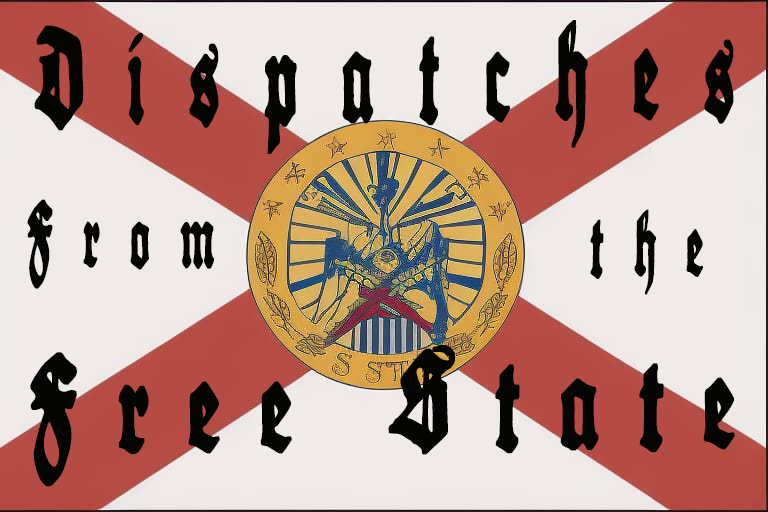A thought on poverty from our discussion in Social Problems last week
Note: The following post was originally published at The Living Text Blog, my college sociology forum. I thought it would go well here at the Mad Sociologist.
 I wanted to comment on something that came up in our discussion on poverty last week…then I got sick and just didn’t feel like it. Now I’m better.
I wanted to comment on something that came up in our discussion on poverty last week…then I got sick and just didn’t feel like it. Now I’m better.
Last week our topic turned to Social Security. During the discussion one student expressed disdain that Social Security payroll deductions were taken out of his check, and I quote, “…at gunpoint.” Really? Gunpoint?
Yeah, technically, not paying social security is illegal, but “gunpoint?”
In fact, it is a very common claim, and a good one, too. It’s brief and visual and violent. It conjures up the image of a bandit, or tinhorn dictator extracting his ransom from the innocent. Of course, bandits and tinhorns don’t ultimately end up providing an old age pension to their victims, but that complicates the matter.
Indeed, the “at gunpoint” meme is very common. It’s used to discredit any particular tax that might be offensive. So, for instance, I as a long time peace activist, may make the claim that a significant portion of my tax dollars is going to the creation of bombs and weapons of mass destruction. Or maybe you are offended that your tax dollars are going to build roads that you will never drive on. Whatever the grievance, the “at gunpoint” meme is your friend. It doesn’t really do anything to advance the debate or to promote enlightened discourse, but that’s not necessarily the point of claimsmaking.
The point is, that people, especially Americans, are resentful for having to spend money on stuff that does not directly benefit us. Indirect benefits do not count. This is part of a larger claim that taxes constitute a theft from the citizens by the government, and the lower the taxes the better.
This is clearly not true. If you want to do a little mind experiment, try to imagine a world without taxes. Imagine every road in the nation being privately owned. How would our economy fair if one had to pay private tolls every time they turned a corner? Clearly, taxes play a role in a successful society. True, taxes can be too high, but they can also be too low.
Instead of understanding taxes as a theft, how about we change the paradigm? Let’s define taxes as dues paid to derive benefits from society. After all, had Bill Gates been born in a rural village in Uganda, he wouldn’t be Bill Gates. He may still be a brilliant businessman and technological innovator, but a multi-billionaire? No. Bill Gates rose to prominence because he was the benefactor of certain entitlements offered to upper middle class families in the United States.
This also implies a change to our understanding of evil government spending. “Government spending!” We practically spit after we say it. To Americans, government spending is rife with graft, corruption and waste. Not without good reason. But is that waste as ubiquitous as we think? Not really. Some conservatives have made the claim that they could cut the deficit just by eliminating waste. They were not, however, able to come up with the numbers. And “waste” is pretty subjective. One’s concept of waste is another’s necessity. Sometimes what looks like waste really isn’t, such as the wasteful government study of goldfish. It turned out, that was part of a government study into underwater robotics with countless applications. All bureaucracies scramble for resources.
Instead of “government spending,” how about “government investment.” Investment infers a certain amount of responsibility into making good investments over bad investments, and a knowledgeable debate with regard to risky investments with the public’s money. The reality is, quite a bit of government “spending” is, in fact, an investment. We mentioned food stamps last week. It seems like an entitlement with no returns, but it turns out that spending on food stamps actually pays a dividend.
Fighting poverty also pays dividends. It’s an investment. Poverty comes with certain inherent costs: crime, disease, educational delays, pollution, early pregnancy, unstable marriages, lower wages, health care, just to name a few. That’s not including the personal costs. The question is, how much of an investment are we willing to put in?
In class, we discussed that most of what is presented as a “solution” to poverty is, at best, “management” of poverty. Indeed, we could identify these plans as a cop out on a willingness to invest in real solutions.
Trickle Down Policies: Reducing taxes, subsidizing business directly or indirectly, is said to result in a “lifting of all ships. Except that there’s never really been an example of this happening. What is the incentive in businesses using their extra money on lifting the poor as opposed to putting the money in their own vaults? There doesn’t seem to be much.
Redistribution: Taxing the wealthy to pay for social safety net programs has, in fact, shown some promise, but enough to justify investment? After all, there is a cost to taxing investors too much. There is also that whole dependence on government thing. On the other hand, what is the difference between being dependent on the government or being dependent on a corporate dominated market? We are all, to a certain extent, dependent. Every time you drive down a road, you are on the government teat (as a friend of mine would say). Regardless, as applied in the United States, redistribution this has fallen short of eliminating poverty.
That leaves Social Investment, which could be seen as a form of redistribution, but with dividends.
So on what should society invest. Well, most of you last week knew that education was key. You will discover, however, that the key is not cut quite as you think. Regardless, social investment in quality education across the board, including public access to tertiary schooling is key.
Secondly, society must invest in jobs. There is plenty of work to be done at the public level. We need more teachers and nurses and public services. American infrastructure is an international joke costing businesses hundreds of billions of dollars every year (perhaps as much as $3 trillion by 2020). We all recognize the need for alternative energy systems and infrastructure. Historically, the nation with the most reliable fuel source wins. Right now many countries like China and the European Union are investing in the next generation of energy while we continue to suck down the last remaining fumes of ancient sunlight. American broadband connectivity is a joke, despite American taxpayers’ initial investment that created the internet.
Millions of people can be educated to do these jobs, then set to work immediately. There’s no need to wait. It just takes a willingness to invest.
Well, the private sector can handle it.
Probably, but they are not, and there’s no reason to believe that they will. Instead, the private sector will invest in nations that already have the infrastructure. This is not a criticism of evil corporations. It’s a commentary on sensible business practice.
The two variables that solve poverty are access to quality education and to jobs paying a living wage. If the private sector will not do it, then that leaves the public sector. So where do we get the money?
Well, I brought this up during class. The reality is that we either get the money from where it is, or we spend money we don’t have. The latter is not entirely unreasonable, but will ultimately create fiscal problems. So then we have to go where the money is. Currently, major corporations are sitting on almost $2 trillion dollars. Or perhaps we can cut back on some of our so called defense spending, but that means cutting back on government contracts that will cost jobs. Can we invest enough to compensate for more unemployed? Raising taxes on the middle class is simply unreasonable right now. The middle class already lacks the buying power to jump start the economy.
And let’s remember, forty percent of working age poor, do, in fact, work. Eleven percent of working age poor are working full time, year round. Over sixty percent from the lowest quintile will pay payroll taxes in 2013. This is not a story about unwillingness to work. It’s a story about misallocation of human resources. After all, why should anyone work, when working does not lift them out of poverty?
The point in this post is not to promote one policy over another. For that, you can go to the Mad Sociologist Blog. The goal is to understand the claims that are being made and what it will take to truly solve the problem in any meaningful way. How, or even if, we solve the poverty problem is in your hands now.
___________________________________
PS: I did some research. Apparently Malaysia has a pretty intense definition of poverty. Really bad example. Better example is Taiwan. Taiwan measures poverty based on a budget economy (minimum income requirement for meeting basic needs) and yet records less than 1% poverty rate.





Leave a comment